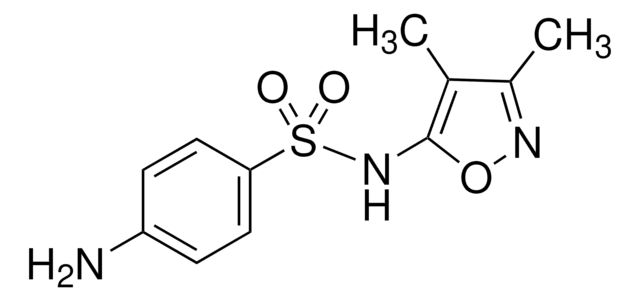S8751
Sulfaguanidine
Sinónimos:
4-Amino-N-(aminoiminomethyl)benzenesulfonamide, 4-Amino-N-guanylbenzenesulfonamide
About This Item
Productos recomendados
biological source
synthetic (Organic)
Quality Level
form
powder
color
white to off-white
solubility
1 M HCl: soluble 50 mg/mL
antibiotic activity spectrum
Gram-negative bacteria
Gram-positive bacteria
mode of action
DNA synthesis | interferes
enzyme | inhibits
SMILES string
NC(=N)NS(=O)(=O)c1ccc(N)cc1
InChI
1S/C7H10N4O2S/c8-5-1-3-6(4-2-5)14(12,13)11-7(9)10/h1-4H,8H2,(H4,9,10,11)
InChI key
BRBKOPJOKNSWSG-UHFFFAOYSA-N
Gene Information
human ... F2(2147) , PRSS1(5644)
¿Está buscando productos similares? Visita Guía de comparación de productos
Categorías relacionadas
General description
Application
Biochem/physiol Actions
Other Notes
signalword
Warning
hcodes
Hazard Classifications
Eye Irrit. 2 - Skin Irrit. 2 - STOT SE 3
target_organs
Respiratory system
Storage Class
11 - Combustible Solids
wgk_germany
WGK 3
ppe
dust mask type N95 (US), Eyeshields, Gloves
Certificados de análisis (COA)
Busque Certificados de análisis (COA) introduciendo el número de lote del producto. Los números de lote se encuentran en la etiqueta del producto después de las palabras «Lot» o «Batch»
¿Ya tiene este producto?
Encuentre la documentación para los productos que ha comprado recientemente en la Biblioteca de documentos.
Los clientes también vieron
Nuestro equipo de científicos tiene experiencia en todas las áreas de investigación: Ciencias de la vida, Ciencia de los materiales, Síntesis química, Cromatografía, Analítica y muchas otras.
Póngase en contacto con el Servicio técnico










